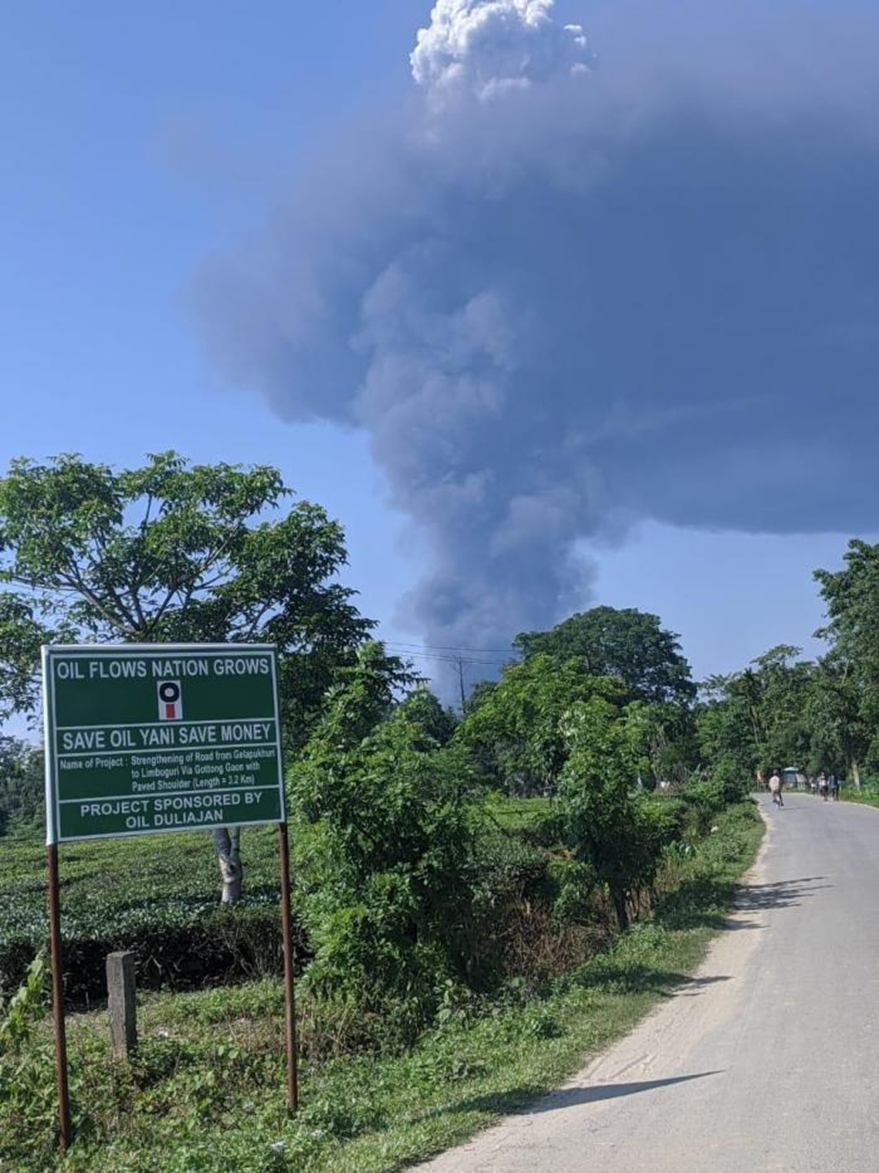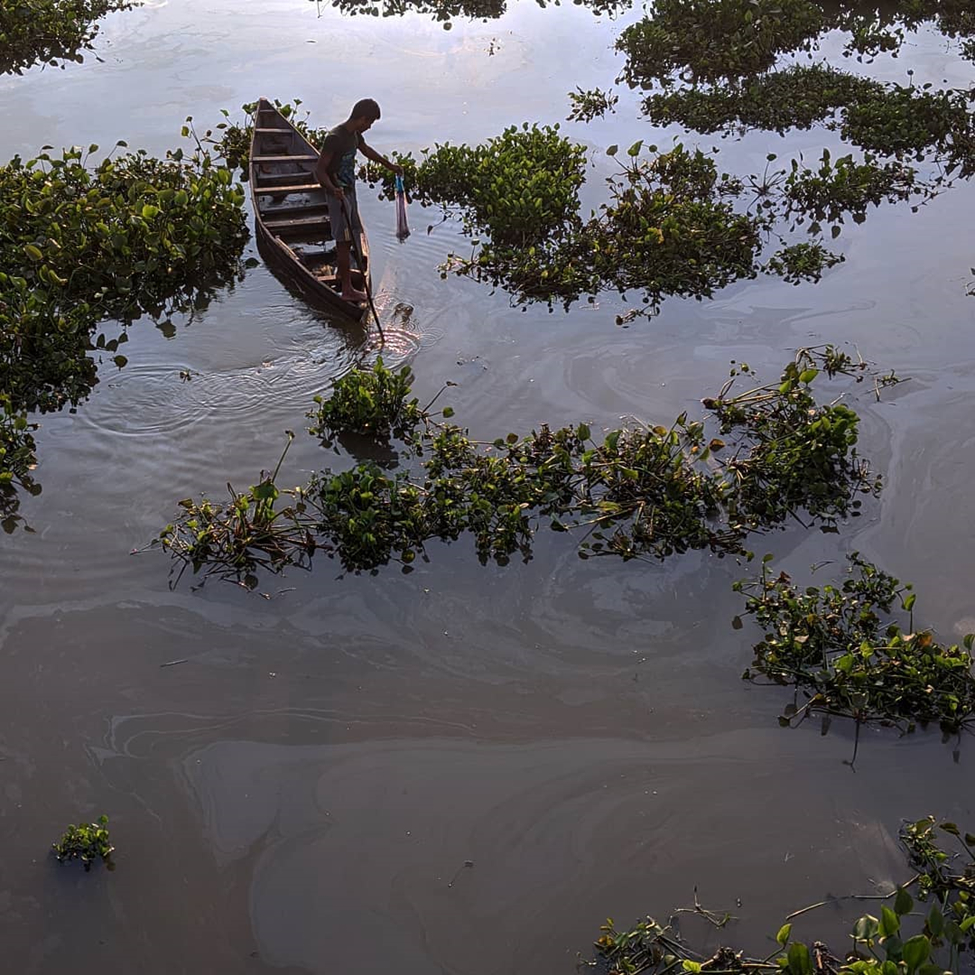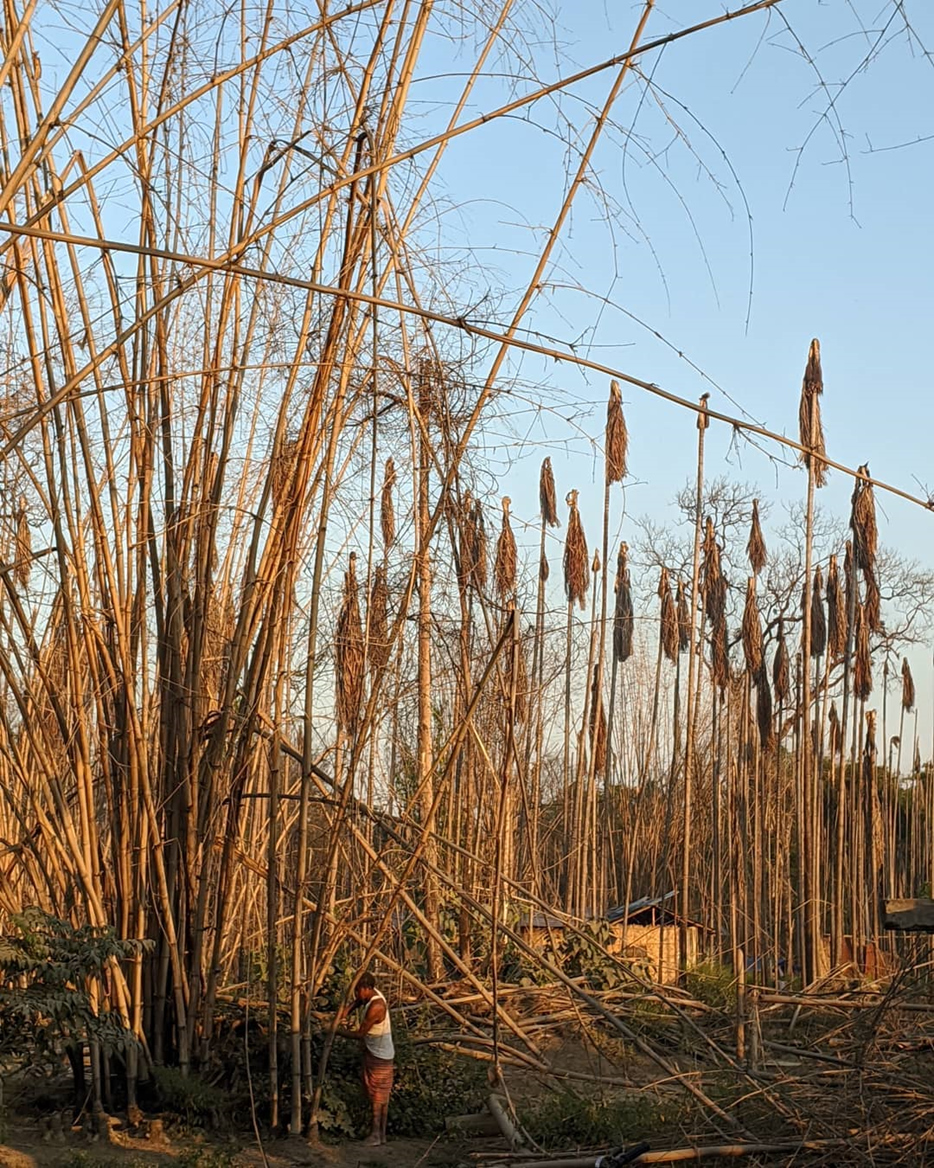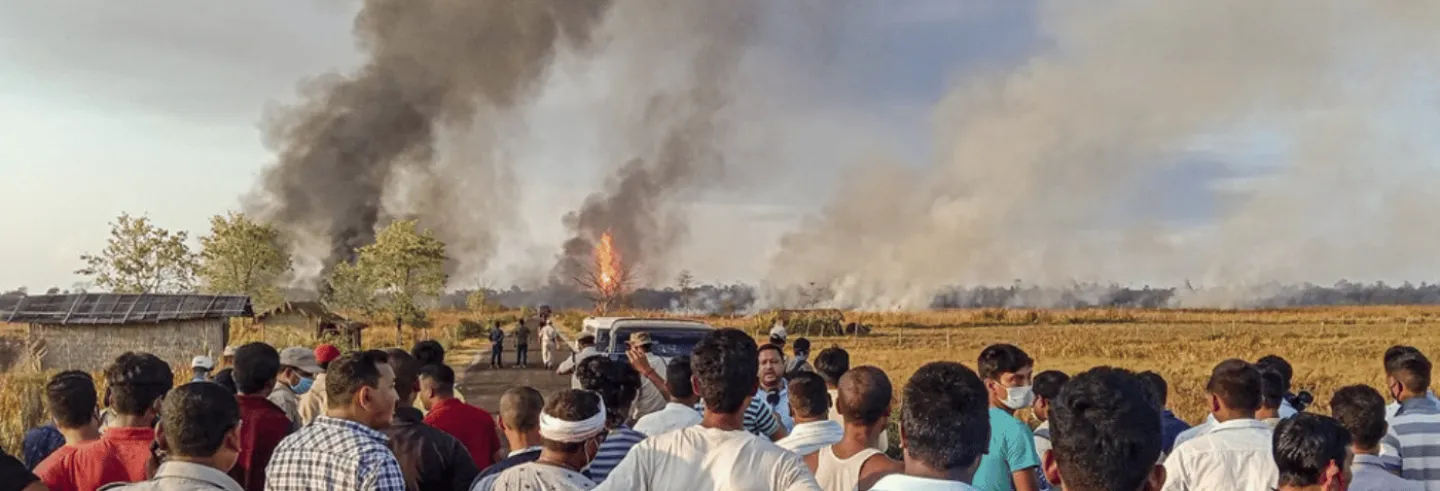On 5 September 2024, the National Green Tribunal (NGT) bench in Kolkata was scheduled to hear a claim for losses and damages ensuing from the 2020 Baghjan oil well blowout in Assam, the worst hydrocarbon disaster in the state.
Fourteen hundred kilometres away to the north east, in villages next to the disaster site, the petitioners, Monoj Hazarika and Niranta Gohain, prepared to present themselves before the tribunal. To wish them a safe journey and a favourable hearing, fellow villagers lit saki, earthen oil lamps, and offered prayers at the namghors, the traditional community place of worship. There was excitement amongst the victims across villages affected by the disaster that after multiple deferrals and delays, they would finally get a verdict for just compensation.
Judicial delays have become a tactic to torture and inflict harm upon the community and the landscape which has suffered irreparable damage.
In the four years since gas surged out uncontrollably from an oil well operated by the central public sector company, Oil India Limited (OIL), and set off a blaze, life has not been the same for the affected communities. Living on the contaminated land and amidst the polluted water bodies, each day brought back the trauma and violence of the unceasing extraction of crude oil. Heavy machinery continued to be trucked in. Endless fleets of SUVs ferried company employees in and out. The constant deafening sound from the oil wells left the villagers in perpetual fear of another blowout. Even animals had stopped coming to the villages to look for food, displaying a newfound fear towards humans. Flocks of birds had altered their flight paths in the skies above the disaster zone.

In Kolkata, the NGT heard Hazarika and Gohain’s case for two days before deferring judgement, despite one being promised. In the affected villages, there was a unanimous feeling that the public outrage against the Baghjan blowout was weak across Assam and at the national level. As Hazarika told us in 2022, “Wherever there is money involved, people lose their humanity.”
Yet, even after the NGT postponed the judgement, he was optimistic. He told one of us (Noihrit) that it was impossible for the court to overlook the struggles the victims continued to face due to the oil spill and the role of OIL in causing the damage.
The Baghjan case is one of the few cases in contemporary India where a local community has taken an oil company to court to hold them accountable for environmental destruction. The people of Baghjan and Notun Rangagora want a judgement in this case to become a benchmark for environmental justice in India. To those of us outside, their struggle invites us to practice the responsibility to hold guilty the perpetrators who damage lives, water, and land.
An extractive landscape
Monoj Hazarika and Niranta Gohain are from Baghjan and Notun Rangagora, respectively, adjoining villages in Assam’s Tinsukia district, a place that has long experienced a militarised extractive regime since the 19th century. OIL, which now has 22 oil and gas wells in Baghjan, came to the village in early 2000. The initial response on the ground differed: villagers from Notun Rangagora resisted the entry while the people of Baghjan were hopeful the industry would improve their economic lot. Over time, though, the latter realised there were no benefits forthcoming. Instead, they lost vast areas of land to OIL and saw the destruction of their landscape.
Soon, mass demonstrations and road blockades became common, to which the state responded with violence. Many villagers were jailed under various charges, some even being labelled as insurgents. As the state imposed itself through violence, the people’s demands for jobs, better infrastructure, and other socio-economic improvements were directed at OIL. Such demands and subsequent transactions created a perception of OIL as a patron of the community, especially when contrasted with the lack of state welfare and benefits. OIL began to assert and reinforce its pre-eminent role in the areas and took on the role of the state.

The 2020 blowout was a moment of absolute clarity that allowed the people to document the immediate loss and destruction of the landscape from the gas blowout, but also voice out their growing discomfort with the hydrocarbon extraction from the land.
After the blowout, the NGT appointed a committee headed by a retired Guwahati High Court judge to investigate the causes of the event. The final report of the committee deemed the entire oil and gas field in Baghjan illegal and in violation of many environmental regulations. Based on the committee’s recommendations, affected families were categorised into three groups that would receive receive Rs 25 lakh, Rs 15 lakh, and Rs 10 lakh, respectively, as interim compensation, with final compensation to follow after a full damage assessment. However, following discussions between the village community, OIL, and the district administration, all families were promised Rs 25 lakh. While the company has accepted the liabilities for the blowout and claims, it has distributed Rs 103.13 crore as compensation to the affected village, most of this this amount was spent on providing immediate relief, including relocating families to relief camps immediately after the blowout. OIL says it is committed to pay another Rs 68.05 crore to 600 affected families, but this is significantly less than the interim compensation promised in the tripartite meeting.
As the nearly 9,000 displaced people returned to Baghjan and nearby villages, they found charred paddy fields and contaminated wetlands. The river tributaries could no longer be depended on for sustenance and livelihood.
In January 2023, Hazarika and Gohain approached the Supreme Court, which transferred the matter to the NGT and ordered it to settle the interim compensation issue within two months. However, the hearing was repeatedly delayed as OIL and the Assam government failed to provide data or comply with court orders. The villagers repeatedly wrote letters to the district administration and the state government, went on strikes and protests, and collected evidence in form of interviews and surveys to support their case. All of this meant village communities had to sacrifice time and energy they would have spent working on their agricultural fields.
In July, the NGT provided a fourth extension to the Assam government to submit the necessary documents related to the payment of interim compensation, with an assurance that a final verdict would be delivered on 5 September. That judgement did not come.
This failed promise of the judiciary to deliver justice speaks volume about the priorities of the state. Judicial delays have become a tactic to torture and inflict harm on the community and the landscape, which has suffered irreparable damage.
Enduring trauma
After the blowout in May 2020, it took six months to cap the oil well and extinguish the fire. But as the nearly 9,000 displaced people returned to Baghjan and nearby villages, they found charred paddy fields and contaminated wetlands. The river tributaries could no longer be depended on for sustenance and livelihood. Coming back did not mean a return to their former lives.
"We will have to live with it for life. It won’t leave us nor the trees, ponds, and houses," said Sabita Bora, a resident of Baghjan, who was displaced by the spill explained the impact of the blowout on all forms of life.
In Baghjan and Notun Rangagora, people no longer cherish fishing in the wetlands and nearby tributaries, weaving on their porches, or engaging in community events and festivals. Large swathes of agricultural fields remain barren. Biswajit Moran, a farmer in Baghjan, is reluctant to work the paddies, considering it futile to invest efforts in farming when another blowout could well destroy their fields and crops once again. Many of his peers agree with him. This perpetual apprehension eroded the villagers’ sense of attachment to the place they call home.
For the communities on the ground, there is a general dismay regarding the delay of judgement, but their frustration is aimed at the government of Assam for delaying the case and against the judiciary for failing to deliver justice.
In February 2024, Amrita Gogoi, a political scientist from Dibrugarh University, and one of us (Noirhit) surveyed Baghjan residents to assess their physical and mental health three years after the oil spill. They found an increase in angry outbursts and irritability amongst the residents. Respondents, mostly middle-aged, spoke of difficulties in falling or staying asleep. The report noted a loss of interest in parenting as well. Kanak Moran from Baghjan village said she was frustrated with repeating lessons for her children.
Many residents were easily frightened or startled by the loud sounds from the extraction sites, or even fireworks. Gobinda, a six-year-old boy would panic at noises and tell his father, Horuphul Panging, that the blowout was happening all over again and that they needed to escape. Horuphul, who had returned to Baghjan to find only the charred remains of his shop, soon moved away with his family to Tinsukia.

Many residents had nightmares and traumatic flashbacks. Monubha Bora from Baghjan recalled waking from an afternoon nap to a distressing dream and was convinced that the fire had returned. Panicked, she woke her son and screamed for her family to flee. She grabbed a box of important documents and ran out of the house before she realised it was just a dream. She said, "Since the incident, we are always ready to escape."
Smiley Neog’s story was more tragic. Her father had been one of the first victims of the blowout. In 2020, after the fire destroyed his home and paddy field, unable to bear the loss, he took his own life by ingesting poison. Now, back to the village after the fire was quelled, Smiley dreamt of her late father; in her dream, he urged her to consume pesticide stored at her home and end her life. She attempted to follow her father's directive but survived after a harrowing struggle and several hospital visits in Tinsukia. Her family has since left Baghjan and relocated to Kakopothar, a village 30 kilometres away.
Justice delayed is violence for victims because they cannot work on closure. They live lives in a state of suspension; squandering time, commitment, and money to follow up on the case.
In response to these feelings, residents consciously avoid the gas blowout areas and nearby oil wells, places they once passed through without a second thought. A deep and pervasive sense of mistrust prevails. Residents have become hesitant to venture out alone, especially after dark. Where once they felt secure, now they are consumed by an unshakeable fear that something could go wrong at any moment.
The discovery of more oil in the area exacerbates these feelings, making them reluctant to rebuild homes, make purchases, or even plan for the future, as the threat of another disaster looms large in their minds. This mistrust extends beyond their environment to their relationships, altering the way they interact with neighbours and family members. The emotional and physical responses to these fears have fundamentally changed their outlook on life, leaving a lasting impact on their sense of trust and security, as they struggle to reclaim a sense of normalcy in a precarious world.
Closure denied
The people of Baghjan and Notun Rangagora continue to demand justice from a charred and poisoned ground. They want a judgement that becomes a benchmark for environmental justice in India. Compensation, according to the victims of the blowout, is about fairness, a payment offered after weighing the loss, damages, injury, and destruction they suffered. For the communities on the ground, there is a general dismay over the delay of judgement, but their frustration is aimed at the government of Assam for delaying the case and against the judiciary for failing to deliver justice.
Justice delayed is violence against the victims because they cannot work on closure. They live lives in a state of suspension; squandering time, commitment, and money to follow up on the case. As the hours pass and Baghjan awaits justice, the hands of the clock unceasingly sweep in the continued horrors of damage and panic.
Noihrit Gogoi is a research associate at the North Eastern Social Research Centre, Guwahati. Dolly Kikon is a professor at the Department of Anthropology, University of California Santa Cruz.










